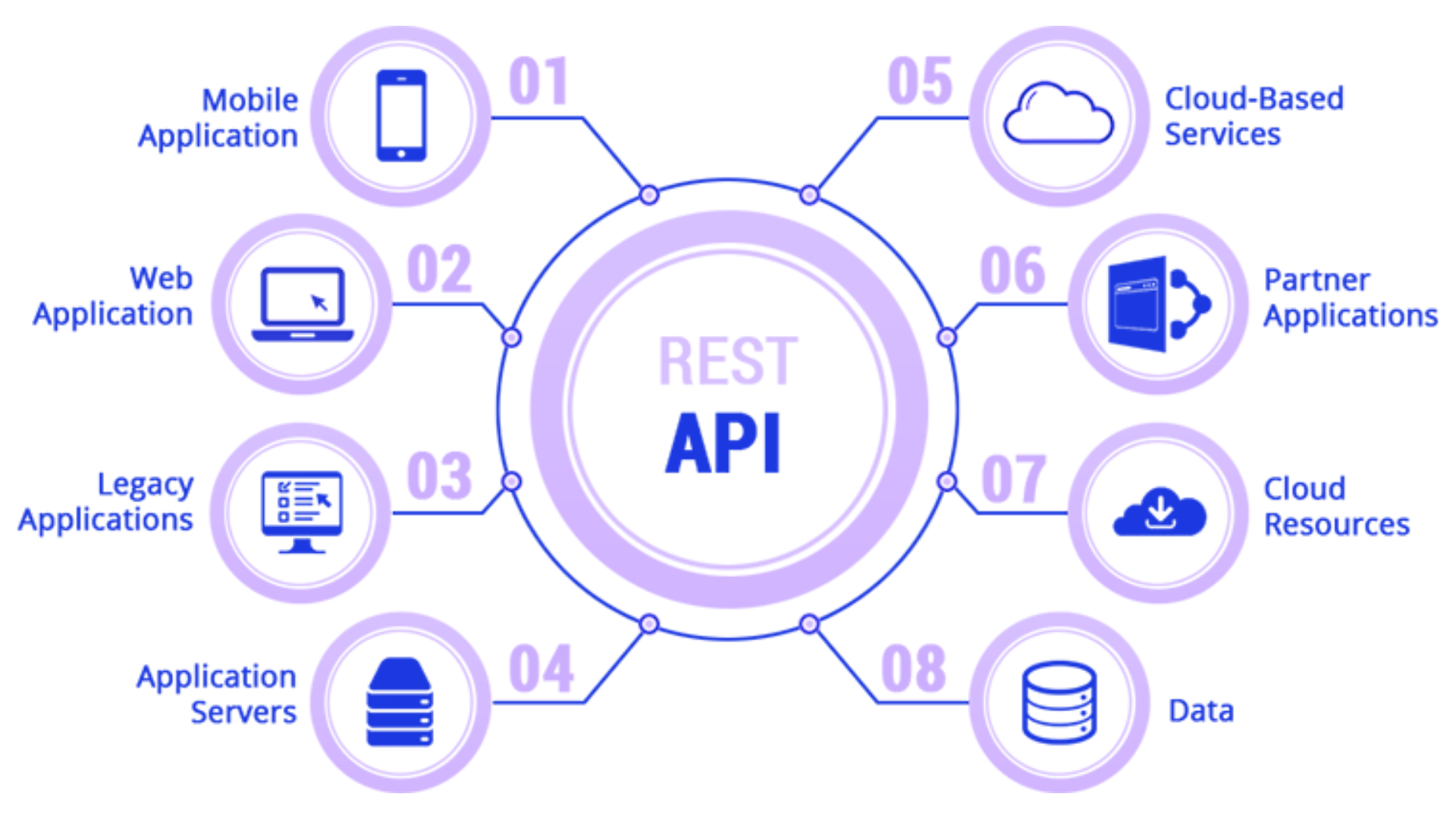
Research Whitepapers
Developing Robust APIs with REST
Introduction
Representational State Transfer (REST) is a widely adopted architectural style for building APIs that are scalable, maintainable, and interoperable. REST APIs power modern web and mobile applications by facilitating seamless communication between clients and servers using HTTP protocols. They are designed to be lightweight, stateless, and versatile, making them ideal for various applications ranging from e-commerce platforms to IoT systems. Tools like Postman, Swagger, and AWS API Gateway help developers create, test, and manage REST APIs efficiently. This paper explores the services, features, and technologies involved in developing robust REST APIs. For custom API solutions tailored to your needs, partner with NextGen Coding Company and elevate your application development.

Services
REST API development services provide organizations with the tools and expertise needed to design scalable and secure APIs that meet modern application demands:
- Custom API Design and Development
Tailored REST APIs are designed to meet specific business needs. Developers use frameworks like Express.js and Django REST Framework to create endpoints optimized for performance, security, and maintainability. - Third-Party API Integration
Integration with existing APIs like Google Maps API and Stripe API extends application functionality, enabling services such as payment processing, location tracking, and analytics without building from scratch. - Secure Authentication and Authorization
REST APIs integrate with secure protocols like OAuth 2.0 and identity providers such as Auth0 to ensure secure access control and user authentication for applications. - Versioning and Lifecycle Management
By implementing API versioning practices, developers maintain backward compatibility while enabling future enhancements. Tools like SwaggerHub manage API documentation and version tracking seamlessly. - Data Transformation and Normalization
Middleware tools like GraphQL REST Wrappers convert REST data structures into user-friendly formats, ensuring consistent and efficient data delivery across applications. - Monitoring and Analytics
Platforms such as New Relic and AWS CloudWatch provide real-time monitoring and analytics, helping businesses optimize API performance and troubleshoot issues proactively. - Deployment and Scaling
Cloud services like AWS API Gateway and Google Cloud Endpoints enable efficient deployment of REST APIs while providing auto-scaling to handle fluctuating traffic demands.
Technologies
REST API development relies on a robust set of tools, frameworks, and technologies to create scalable, secure, and efficient solutions:
- Backend Frameworks
Popular frameworks such as Express.js, Django REST Framework, and Flask enable developers to build RESTful endpoints quickly with minimal boilerplate code. - API Gateways
Platforms like AWS API Gateway and Google Cloud Endpoints manage API traffic, enforce security, and provide monitoring capabilities. - Database Integration
REST APIs integrate seamlessly with databases like PostgreSQL, MySQL, and MongoDB to retrieve and store application data efficiently. - Authentication and Security
Tools such as OAuth 2.0 and JWT provide secure mechanisms for authenticating and authorizing API requests. - API Testing and Debugging
Platforms like Postman and Insomnia enable developers to test endpoints, validate responses, and debug issues throughout the development process. - Monitoring and Logging
Tools like New Relic and Loggly track API performance and logs, providing insights into traffic patterns, errors, and potential bottlenecks. - Containerization and Deployment
Technologies like Docker and orchestration platforms like Kubernetes streamline the deployment and scaling of REST APIs in containerized environments. - Version Control and Collaboration
Tools like GitHub and GitLab facilitate version control and team collaboration during REST API development.
Features
REST APIs offer a range of features that ensure reliability, scalability, and ease of use, enabling developers to build applications that meet diverse user requirements:
- Stateless Communication
REST APIs operate statelessly, meaning each request from a client contains all the information needed for the server to process it. This simplifies server-side logic and enhances scalability by enabling horizontal scaling across multiple servers. - HTTP Methods for CRUD Operations
REST APIs leverage standard HTTP methods like GET, POST, PUT, and DELETE to perform CRUD (Create, Read, Update, Delete) operations. This standardization simplifies implementation and ensures interoperability across platforms. - Resource-Oriented Architecture
REST APIs focus on resources, represented by unique URLs. Each resource can be accessed and manipulated independently, allowing developers to build modular and reusable endpoints. - Content Negotiation
REST APIs support content negotiation, enabling clients to request data in various formats such as JSON, XML, or HTML. This ensures compatibility with a wide range of applications and devices. - Caching for Improved Performance
Caching mechanisms, such as HTTP headers and reverse proxies, reduce server load and enhance response times by storing frequently requested data closer to the client. - Pagination and Filtering
REST APIs support pagination, sorting, and filtering mechanisms, enabling clients to retrieve large datasets efficiently and tailor results to specific requirements. - Error Handling and Status Codes
Clear and consistent error handling is a cornerstone of REST APIs. Standardized HTTP status codes (e.g., 404 Not Found, 401 Unauthorized, 500 Internal Server Error) provide meaningful feedback to developers and users. - Comprehensive API Documentation
Tools like Swagger and Postman generate detailed API documentation, including examples, endpoints, and usage guidelines, ensuring developers can implement APIs effectively.
Conclusion
REST APIs are the backbone of modern web services, providing a versatile and reliable way to connect applications, services, and devices. With features like stateless communication, resource-oriented design, and standardized HTTP methods, REST APIs ensure scalability, efficiency, and interoperability. Platforms like Postman, Swagger, and AWS API Gateway offer the tools and infrastructure necessary for building and managing robust APIs. By adopting RESTful practices, businesses can enhance their application capabilities and deliver seamless user experiences. For tailored REST API development that meets your specific needs, partner with NextGen Coding Company and empower your applications to perform at their best.
Let’s Connect
At NextGen Coding Company, we’re ready to help you bring your digital projects to life with cutting-edge technology solutions. Whether you need assistance with AI, machine learning, blockchain, or automation, our team is here to guide you. Schedule a free consultation today and discover how we can help you transform your business for the future. Let’s start building something extraordinary together!